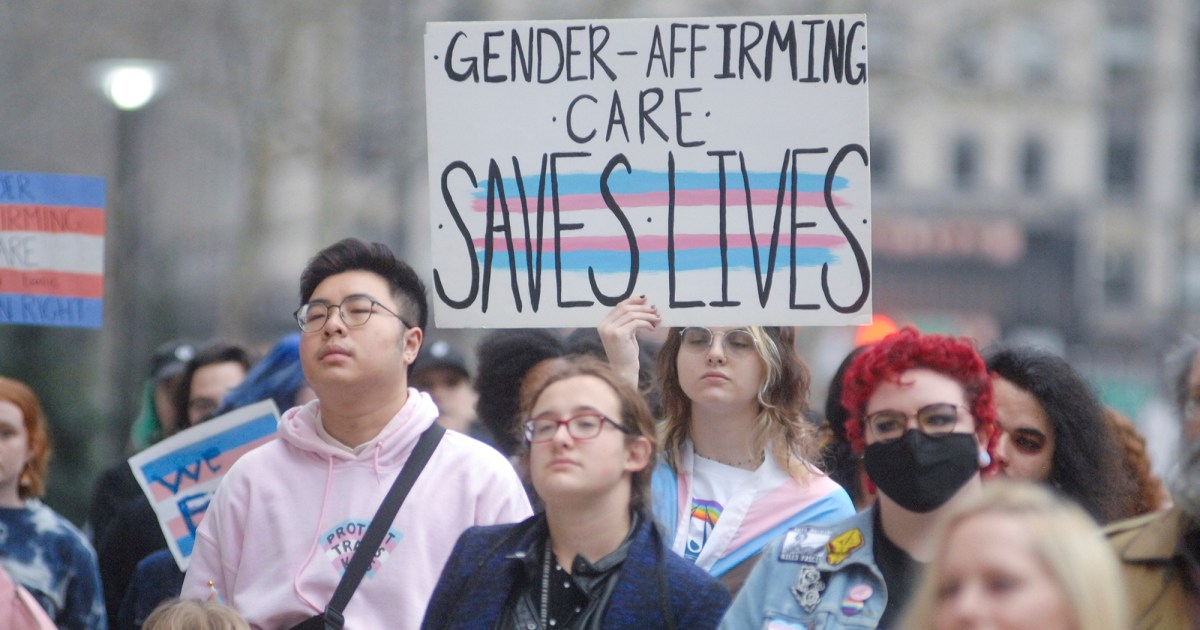Last week, Max, a trans man in North Carolina in his twenties—and my childhood friend—got top surgery.
“I didn’t cry when I saw the results because it just looks like how I feel it should,” Max wrote in an email. He cried later, he said—when he realized he’d been able to “build a body I feel fully at home in.”
Three days after Max’s surgery, Donald Trump’s “Big, Beautiful Bill,” a massive package of GOP tax and spending legislation, passed the House with a last-minute amendment that would ban Medicaid and Affordable Care Act marketplace plans from covering transgender health care like Max’s surgery and hormone replacement therapy. Approximately 185,000 trans adults, or about one in twelve in the US, are on Medicaid, according to the University of California, Los Angeles’ Williams Institute.
Max could only afford his surgery because it was covered in part by Medicaid. Medicaid also provided his hormone replacement therapy—prohibitively expensive without insurance—and the rest of his health coverage for the last several years, while he’s juggled school with full-time work.
The “Big, Beautiful Bill” has yet to pass in the Senate, and Democratic senators are working to use the Byrd Rule, which limits “extraneous” provisions to the budget, to remove its amendment against gender-affirming care.
“I want more than anything for other trans people to have the options I did.”
If the bill passes with that amendment intact, said Jennifer C. Pizer, chief legal officer at LGBTQ civil rights nonprofit Lambda Legal, “There will be litigation, because the harms are quite serious and it legitimizes the range of other cruel and unjustifiable treatments of transgender people.”
The provision against gender-affirming care, Pizer pointed out, wouldn’t force all states to follow suit; she cited California’s use of state funds to cover domestic partners’ health insurance before federal law recognized same-sex relationships. States protective of transgender rights may take similar steps. But for those with a history of anti-LGBTQ legislation, there’s less hope: ten states already exclude coverage for such care in their Medicaid plans for all ages.
And the Trump administration, Pizer noted, has unlawfully pulled federal funding from programs it opposes—a “battering ram” it may use against states taking action to fund transgender healthcare.
That, together with the administration’s other attacks, has trans people on Medicaid fearful even in states with strong LGBTQ rights protections.
Ory and Caleb, both from Oregon, spoke positively about the state’s Medicaid program. Caleb described the care it provides as vastly improving their mental health; Ory called it “lifesaving.” But both have started to make backup plans to stock up on testosterone out of fear of losing access.
An Oregon law prohibits insurance carriers from denying medically necessary gender-affirming treatment, putting it in direct conflict with the new federal provision should it pass. It’s not clear how such tensions between federal and state authority will be resolved, Pizer said.
Alex joined Medicaid after the death of her partner compelled her to move close to where she grew up in Illinois. She started HRT on the day of Trump’s election. “I did not really plan it that way,” she said. “Let me tell you, that was not fun.”
Still, Alex has loved HRT: “It no longer felt like my body was fighting itself,” she said. “It feels internally aligned in a way I did not know it could previously.”
Alex called her senators for the first time to urge them to vote against the budget bill. Its authors “can pry my estrogen from my cold, dead hands,” she said, “and I’m not going anywhere anytime soon. Fuck those motherfuckers.”
Max, in North Carolina, was hit viscerally by the latest attempt to slash the care he was relying on. “It was a rollercoaster of emotions,” he said, from euphoria and recovery following his surgery to grief following the news.
“They can pry my estrogen from my cold, dead hands.”
The bill’s last-minute modifications to strip trans health coverage were made in a “cowardly way,” Max said—at night, with no cameras present—in “a pathetic attempt to avoid backlash, basically admitting that this is a terrible idea.”
“Trans people are vulnerable, but we are not weak,” said Alex. “We will always stick up for one another. We have always existed, and we always will exist, and there’s nothing that anybody could do to stop that, no matter how hard they try.”
Still recovering from surgery, Max writes, “I’m living the dreams of the little boy I used to be.” His wish? “I want more than anything for other trans people to have the options I did.”















